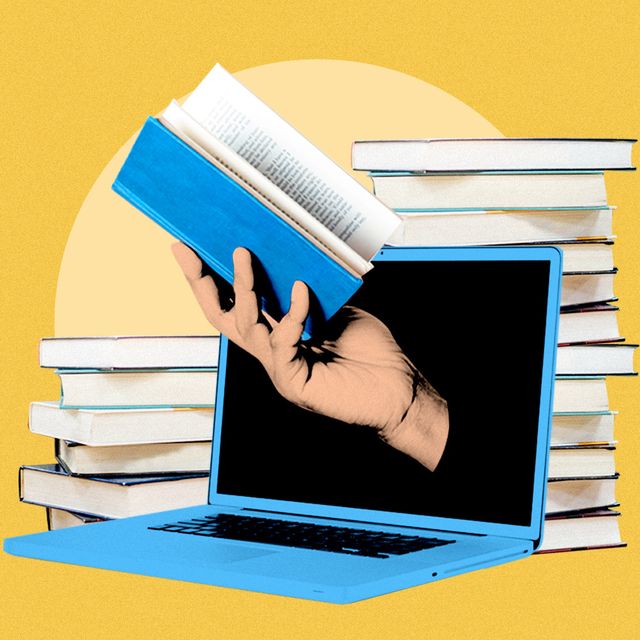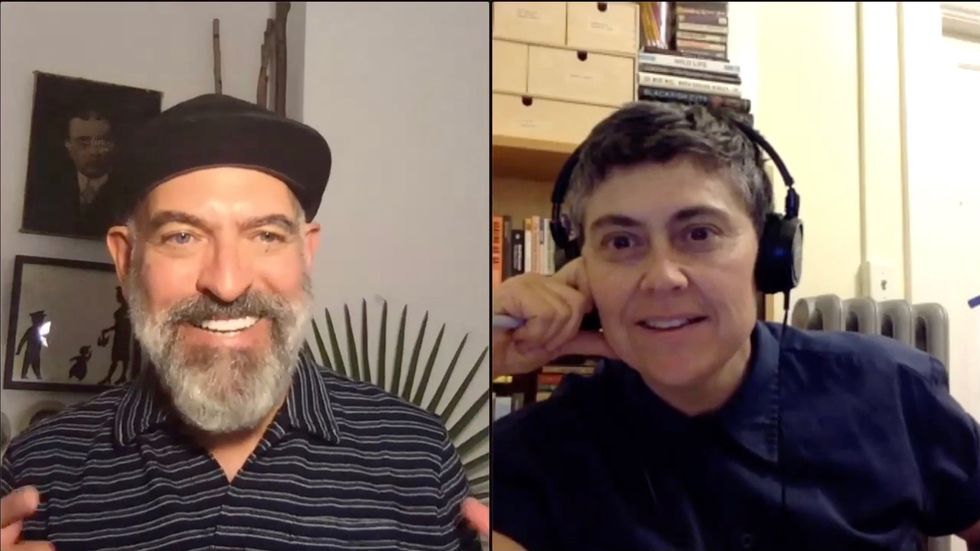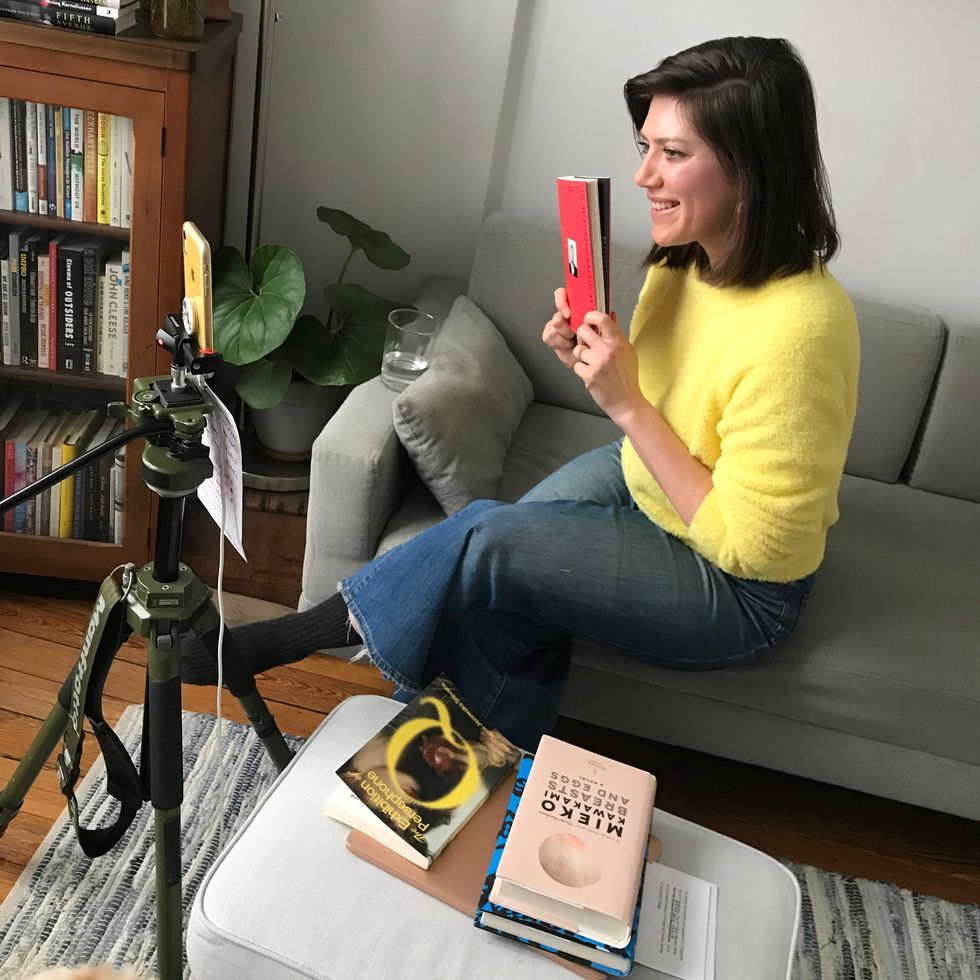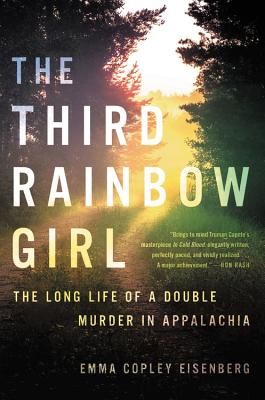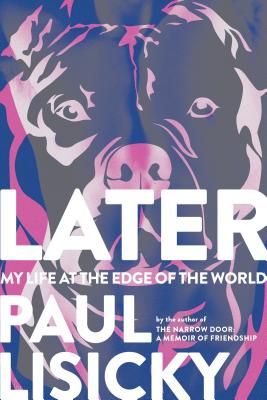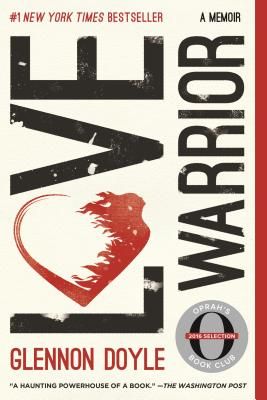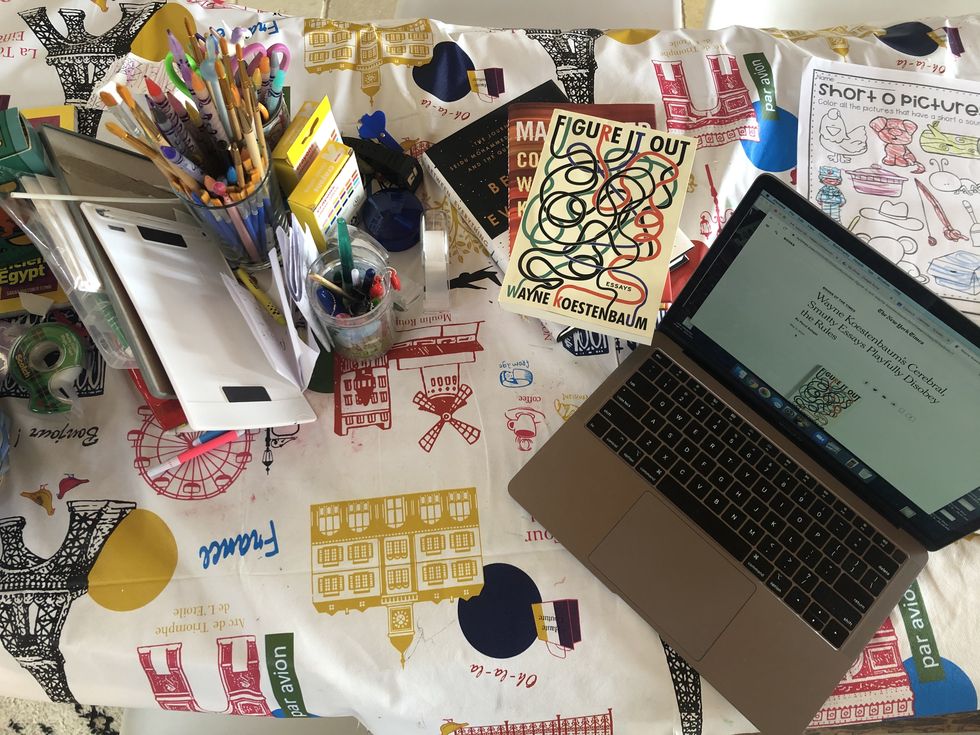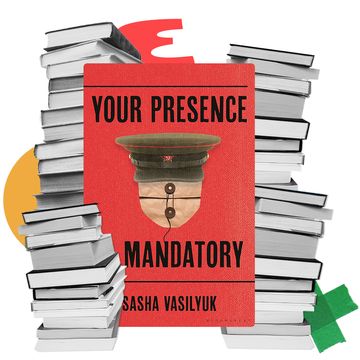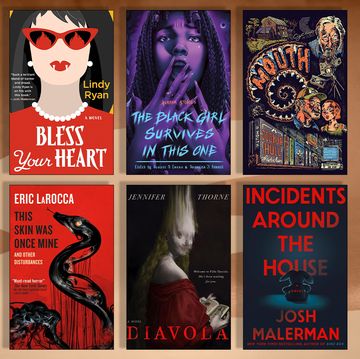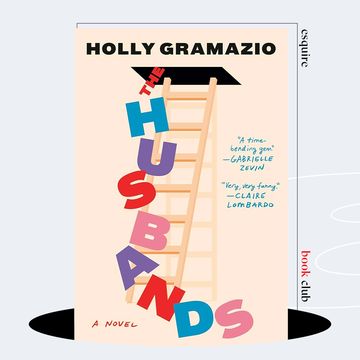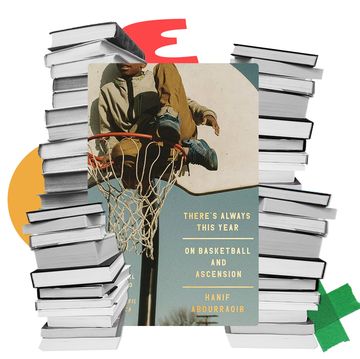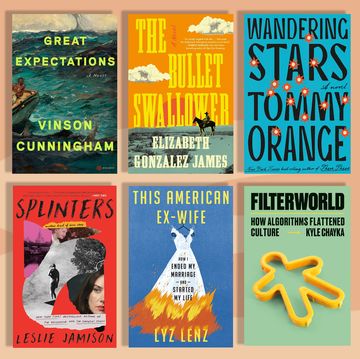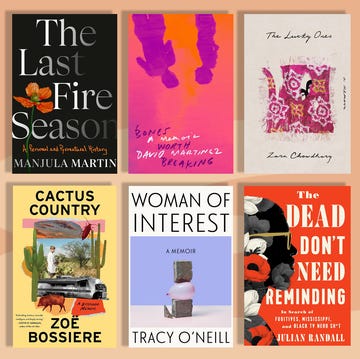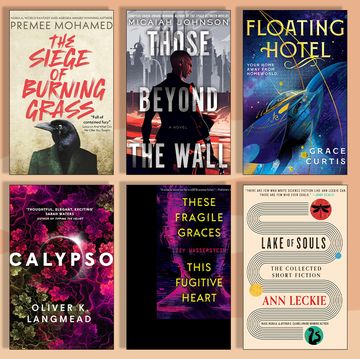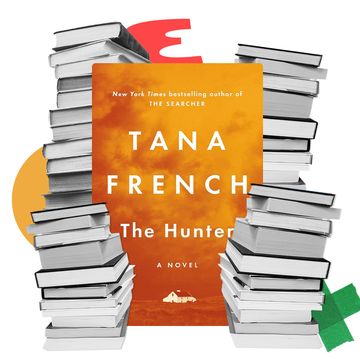“They weren’t cancelled all at once,” writer Paul Lisicky said of the twenty-two stops on his cross country book tour. “No one gave me a phone call and said, ‘Your book tour is cancelled.’ It all went down one by one. It felt like a kick to the heart.”
Lisicky’s book tour wasn’t supposed to go this way. To fete the release of his sixth book, a memoir of the AIDS crisis titled Later: My Life at the Edge of the World, Lisicky was scheduled to appear at twenty-two bookstores over the course of six weeks. Beginning in mid-March, his journey was set to take him to indie booksellers all across the United States, from Brooklyn to Portland, Los Angeles to Chicago, San Francisco to Houston. Then the coronavirus pandemic descended on American life, shuttering booksellers in cities both large and small, and soon after, it was death by a thousand cuts, with all twenty-two stops on the tour falling like dominoes.
Like most industries, book publishing has been pummeled by the pandemic, with booksellers closing their doors to the public, publishers scrambling to turn a profit in a disrupted market, and writers imperiled as their sources of income evaporate. Authors like Lisicky, whose long-awaited publication dates have fallen during this global crisis, are saddled with the daunting task of launching their books into a landscape unable to receive them in the traditional manner. Yet even as the industry reels, the ever-indefatigable literary community is rising to the occasion in surprising ways, coming to a forceful and impassioned defense of those who make their livelihood through books, whether it’s selling them or creating them.
A book tour is many things: a means to move sales numbers, a forum for lively conversation, a process by which the literary establishment crowns rising stars and celebrates established names. On the personal level, it’s also a “victory lap,” as Emma Copley Eisenberg describes it—a celebratory cavalcade of hugs and praise that occurs only once every five to seven years for the average writer. Eisenberg is the debut author of The Third Rainbow Girl: The Long Life of a Double Murder in Appalachia, a work of narrative nonfiction about two unsolved murders that occurred in Pocahontas County, West Virginia circa 1980. With her book hitting shelves in January, Eisenberg managed to evade the brunt of the pandemic; nonetheless, seven events on the back end of her tour were cancelled, while a number of press opportunities were scuttled as news organizations shifted their priorities.
“On the one hand, you know that your woes are very small in the grand scheme of things,” Eisenberg said. “Obviously it’s a huge blessing that my book is out at all, but you have a vision of what it will be like to publish a book, especially your first book. It’s an experience that lacks a great deal of control to begin with, and with the additional tragedy of these events, it introduces even more factors beyond your control. No matter how much you hustle, it’s up to the universe how the book performs, at this point. I feel a mix of resignation and retreat, but also disappointment, frenetic energy, sadness for others—all those feelings all at once.”
In an age when hugs and cross-country travel are no longer possible, book tours are going digital. Instead of a packed bookstore teeming wall to wall with folding chairs, a standard literary event in the time of coronavirus consists of the featured author and a moderator Zooming in from their respective homes, with audience members free to come and go from the video chat as they please. For authors like Lisicky, the modified format has paid surprising dividends, with a significant number of readers tuning in from the comfort of their couches, wherever those couches may be.
“Often the numbers are higher for my Zoom events than they are for a traditional bookstore reading,” Lisicky said. “I don’t mean to sound optimistic, but I’ve really enjoyed connecting with audiences in this way. People check in from all over. There was someone from Singapore who heard me read at one of these events. My old students are joining, and people from my publisher, too. That kind of wall-smashing is exciting to me.”
That wall-smashing includes not just an erasure of geographical barriers, which disadvantage readers who live far away from urban areas with thriving literary communities, but of social barriers that tongue-tie authors at the microphone and intimidate readers in the audience. Lisicky is quick to praise the ability of virtual readings to alleviate the butterflies of stage-shy authors, as well as to embolden audience members who might otherwise hesitate to raise their hands.
“I’m one of those weirdos who loves doing bookstore events, but I have to contend with a certain level of stagefright beforehand,” Lisicky said. “That’s not the case when I’m sitting in my living room. Some kind of barrier is down. I think there are people who are more likely to talk and ask questions from the audience than they would in a physical space, because in a physical space with others, they’re often intimidated and don’t want to look stupid or dull. I myself rarely raise my hand at these events even though I’m participating in my head. There’s something about this format that feels safe for a certain kind of person.”
For Eisenberg, the key to thriving on virtual book tour has been to accept the limitations of these events, and to embrace their unique capabilities. She cites the useful addition of Zoom’s chat function, pointing out that it gives an author the ability to receive audience feedback while taking the virtual stage.
“Whenever I try to make it like what it would’ve been like in person, it feels disappointing, but whenever I try to lean into what a digital platform can offer that an in-person approach can’t, it feels really fun,” Eisenberg said.
Among the offerings of the digital platform is an unprecedented sense of intimacy—one that can bond audience members through the shared strangeness of attending a literary event in sweatpants, to be certain, though in other cases, that same intimacy can bring authors a bit too close to their adoring public for comfort.
“We’re living in this very awkward and funny time now where, when you go on Zoom, you can see people’s homes, their pets, their partners walking through, or their kids taking a piano lesson in the background,” Eisenberg said. “There’s something strangely very intimate about it, yet at the same time, it can feel disconnected if people don’t turn their cameras on. There’s a lot more room for mistakes and weirdness, which makes it feel both different and cool at the same time.”
For readers to whom authors exist in an ivory tower, scribbling away furiously in between book launches, this intimacy has the effect of bringing an author down to earth, offering a rare look into their home life.
“At an event I did last night, someone said, ‘I feel like I was in your living room,’” Lisicky said. “I wrote back and said, ‘You were!’”
For bookstore owners like Michael Fusco-Straub, the co-owner of Brooklyn’s Books Are Magic, virtual events are far from the pleasures of business as usual, but they offer booksellers and their communities a much-needed lifeline in these challenging and uncertain times. As he and his events staff of three pivot to this new model, Fusco-Straub likens the new normal to when he first opened the store three years ago, which involved a similar degree of “figuring it out on the fly.”
“The benefit of virtual events is that anyone in the country can watch them,” Fusco-Straub said. “The downside is that there isn’t as much audience participation; it’s a bit more stilted. But it’s great that we’re able to do it, given the circumstances. It’s just wonderful that we can support these authors and get people to buy their books. That said, live events have always been a hallmark of our shop, and to lose that aspect of the community has been very sad.”
Thus far, Fusco-Straub says that Books Are Magic’s virtual events have been a rousing success, with one memorable evening seeing over a hundred participants winging in from their living rooms to listen to a conversation with Robert Kolker, the author of Hidden Valley Road, a work of narrative nonfiction about a large midcentury family stricken by schizophrenia. These conversations not only celebrate the work of authors and anchor the far-flung literary community, but they translate to very real sales for booksellers, with attendees clicking through in droves to purchase the spotlighted books.
Yet booksellers aren’t the only pillars of the literary community turning to virtual events as a means of maintaining lines of communication between readers and writers. Avenues of virtual connectivity are springing up left and right through the efforts of literati like Uli Beutter Cohen, the founder of Subway Book Review, who has repurposed her popular platform for the age of social distancing. Unable to interview readers during their subway commutes, Beutter Cohen turned instead to Instagram Live as a means of fostering connection with her audience, which she says has beget “a whole new type of togetherness.”
With Subway Book Review Live, Beutter Cohen has created what she describes as her version of a talk show, wherein guests appear in conversation on scheduled Instagram Live sessions (Wednesdays at 6:00 PM EST and Sundays at 4:00 PM EST) to share what they’re reading and how they’re coping in social isolation. Her guests thus far have included the writer Alexander Chee, who discussed growing a garden from kitchen scraps; the comedian Gina Yashere, who advocated embracing the macabre during dark times; and chef Alison Roman, who offered book and recipe pairings. Much like virtual bookstore events, Subway Book Review Live offers intellectual nourishment and a newfound sense of intimacy, but also a dose of the “surprise and delight” for which Beutter Cohen always strives in Subway Book Review’s storytelling.
“As a bit of a perfectionist, it was tricky for me to shift gears into my living room and embrace the Instagram Live platform,” Beutter Cohen said. “No shade to Instagram, but it’s far from perfect; sometimes your video interrupts or Instagram crashes when everyone runs online at the same time, but that’s all fine. We can’t be too precious with our creative offerings and our offerings of community. I think that it’s important for people who are community leaders to make an effort to keep bringing people together.”
Like Eisenberg and Lisicky, Beutter Cohen is impressed with the unique functionality that virtual gatherings can offer, namely the feature that allows her to identify who’s tuning into the livestream. Her audience members, once a mystery or identifiable only through their comments on her Instagram posts, are located not just throughout the five boroughs of New York City, but in far-flung locations like Brazil, Italy, Russia, and France.
“It really enforces this feeling that we’re all part of the same family,” Beutter Cohen said. “Now we see each other, and we see each other worldwide. Reading is two-fold—you read a book by yourself, but then you want to talk about it and discuss it. Reading is an amazing way to connect with each other during this lonely time, because we can make reading together time.”
Between Zoom events hosted by booksellers and community-minded efforts from literary citizens like Beutter Cohen, readers are flocking to independent bookstores. At Books Are Magic, Fusco-Straub and a small, socially distanced staff are fielding hundreds of orders a day, with readers primarily turning to adult literary fiction as their means of comfort and nourishment. Popular purchases include pandemic-adjacent reads like Ling Ma’s Severance and Emily St. John Mandel’s Station Eleven, though readers are also signing on for challenging doorstoppers like Robert Caro’s The Power Broker and Leo Tolstoy’s War and Peace. Fusco-Straub jokes that readers are using this surfeit of idle time to knock out these bucket list reads, though they’re also seizing the opportunity to become better home cooks, with Books Are Magic selling copies of Alison Roman’s Nothing Fancy “hand over fist.” Though Books Are Magic has been in business only three years and Nothing Fancy hit shelves just last October, Roman’s beloved cookbook remains the store’s best-selling book of all time, with readers purchasing over one hundred copies per week throughout the pandemic.
Though Books Are Magic is running its lively ecommerce operation with a reduced staff, Fusco-Straub hasn’t laid off any employees, and he continues to pay his entire staff as if they were working the same hours for which they would otherwise be scheduled.
“I’ve had two priorities: I wanted to continue to get books to my customers and I wanted to pay my staff,” Fusco-Straub said. “It’s been an enormous undertaking, but I feel great about it, because our entire staff is continuing to be paid and we’re shipping everything to our customers as quickly as possible.”
Yet not all booksellers are so equipped to weather this storm; in fact, with no end to the pandemic in sight, many have found that their livelihoods hang in the balance. The charitable foundation BINC (Book Industry Charitable Foundation), which provides financial assistance to cash-strapped booksellers, has received applications for emergency assistance from over 670 independent bookstores—more than they received cumulatively between the years of 2012 and 2019. Others are applying for emergency aid through the federal government, albeit with mixed results, like Noëlle Santos, the self-styled proprietress of The Lit. Bar.
Opened by Santos just one year ago in the South Bronx to great fanfare, The Lit. Bar is a bookstore meets wine bar meets community center. As the sole bookstore serving a densely populated borough of approximately 1.5 million people, The Lit. Bar provides a unique service to an underserved community. In mid-March, Santos shut down the store and furloughed her six employees, four of whom are now receiving unemployment and two of whom are still struggling to see results from New York’s unemployment office. Santos applied for emergency relief from the Paycheck Protection Program (PPP), a federal initiative offering small businesses low-interest loans to cover costs while their doors are closed, yet the funding comes with restrictions, as it can only be spent on payroll, rent, mortgage interest, or utilities. Santos was awarded almost $18K in the program’s second round of funding, but she has yet to spend a dime, as she’s afraid to lay out the funds for expenditures that may later be deemed disqualified. She also hesitates to use the funding to reinstitute payroll, as it would only shortchange her furloughed employees, who are earning more on unemployment than they would through payroll.
“Everybody is putting all of their focus into payroll protection, but if I can’t pay my occupancy expenses and I can’t pay my vendors, then there’s no payroll to protect,” Santos said. “Everybody can’t be putting all their resources into this one thing just to get the unemployment numbers down. My team is home being paid more money than they would make normally and staying safe. I’m not going to call them up to say, ‘I got this PPP money, so I’m going to pay you a lot less to stay home.’”
Santos has also applied for a swath of small business relief grants offered by private corporations, leading her to win $5K in funding from Bumble, but these lengthy applications have become “emotional labor,” as she describes them. With large corporations like Facebook, Google, and Verizon dangling tens of thousands of dollars, small business owners are competing around the clock to pitch their stories to these investors, whom Santos argues have mixed motivations for such generosity.
“They definitely want to help you and they’re definitely noble missions, but it’s also a marketing opportunity for them,” Santos said. “They’re looking to fund businesses that have a good story. Day after day, I’m filling out these pages and pages of applications about how I’m a woman of color in the South Bronx, how we operate in the poorest congressional district in the United States, how we’re the only bookstore in a community of 1.5 million people. The process was humiliating after some time. I pride myself on my independence and my perseverance, and on the fact that I’ve been able to create this business from nothing when no one would help me. Now all eyes are on The Lit. Bar, but in the beginning, no one believed that a Bronx reader even existed. Now everybody wants to cut my fucking ribbon, but they were nowhere to be found in the beginning. It’s becoming a full-time job to play the oppression olympics in these essays.”
When she’s not laboring over these applications, Santos is striving to continue her work as a leading light in her community, connecting with The Lit. Bar regulars through social media and through virtual meetings of the store’s book club, one of New York City’s largest at over a thousand members. As The Lit. Bar’s customers can still shop online, with the orders fulfilled by a third-party distributor, Santos is committed to taking it slow in considering her and her employees’ eventual return to business.
“The government designed this program in a way where I’m competing with unemployment insurance,” Santos said. “It’s not a job anyone can do virtually. I want them to be safe and to make as much money as possible, even if I have to suffer a little. I may wait until we’re able to bring customers into the store, like by appointment or at some limited capacity, before I start bringing them back to work.”
In Beverly, Massachusetts, Julie Karaganis and Meg Wasmer of Copper Dog Books have faced similarly hard choices about managing their staff of five employees, all of whom are part-time or “occasional” booksellers. Government restrictions in Massachusetts have until mere days ago mandated that only an owner can enter a closed retail business, meaning that Karaganis and Wasmer have been entirely on their own in fulfilling online orders. Even so, Karaganis and Wasmer have not furloughed their employees, but rather striven to find tasks they can complete from home, like marketing and administrative work.
“We’re lucky in that no one truly depends on us financially,” Wasmer said. “If people want hours for their mental health, it’s a way to feel connected to something and not feel listless. Our focus has been on employee care. More than, ‘I really need you to do this work today,’ it’s, ‘Hey, can you do this thing for me today? It would be a huge help.’ [The goal is] to give purpose rather than to really require them to be doing something to get paid.”
The biggest shift for Copper Dog Books, Karaganis says, is its transformation from a retail storefront to a shipping hub. With just Wasmer working at the store to package and ship books, the business has been overwhelmed, albeit with a good problem to have: in April, sales were up 72 percent compared to sales in April 2019, as the local community has rallied around Copper Dog Books. Sales skyrocketed even further when Glennon Doyle, bestselling author of books like Love Warrior and Untamed, shared her support of Copper Dog Books on Facebook following a note from Wasmer, who wrote to inform Doyle that sales of Untamed during the time of the pandemic had fed her family for two weeks. Though the infusion of sales and support has left Karaganis and Wasmer awed and grateful, they’re reaching their limits in keeping the distribution operation afloat without a staff.
“I start to feel guilty when people ask, ‘How are things going?’” Karaganis said. “I’m like, ‘Oh my God, we’re so busy!’ Meg and I work six days a week just trying to keep up with it. When they announced that we could have our booksellers helping out more, it brought tears to my eyes. Thank God! We need the help.”
With the state now clearing local businesses to perform home deliveries, there’s light at the end of the tunnel for Karaganis and Wasmer, who will bring two booksellers back to work to make deliveries within five miles of downtown Beverly. Yet even as things begin to look up, Karaganis and Wasmer are worried about further curveballs down the road, which led them to apply for federal financial assistance. They received funding through the Economic Injury Disaster Loan (EIDL), a loan advance that provides up to $10K in relief for small businesses. They’re awaiting feedback on their PPP application, as the government failed to publicize guidelines for partnership businesses like Copper Dog Books until one day before the funding ran dry.
“Both of us feel a little uncomfortable applying for that money because our sales have been so good,” Karaganis said. “But we don’t actually qualify for any of the grants that have been coming around because we’re less than a year old. No one knows what the future is going to look like, so that’s why we’ve gone for the funding—just in case.”
Other booksellers in distress have pinned their hopes on Bookshop.org, a new ecommerce vehicle for independent booksellers whose runaway success in this dark time is among the few bright spots of the pandemic. With Amazon consuming the lion’s share of the bookselling market, accounting for almost half of all print book sales and growing at an alarming rate of 9 percent year over year, independent booksellers have been all but boxed out the ecommerce market for books. Independent booksellers face tremendous challenges in wrestling market share away from Amazon, as their modest inventories, limited shipping capabilities, and low-tech websites have long prevented them from competing with Amazon’s ability to ship seemingly any book under the sun in just two days. Enter Andy Hunter, the publisher of Catapult and the co-creator of literary websites including Literary Hub and Electric Literature, who devised a plan to create a website where customers could place orders fulfilled by Ingram, the nation’s largest book wholesaler, and direct the proceeds to independent booksellers.
That website became Bookshop.org, which launched in January with a lean team of four employees. Hunter’s early projections estimated that the operation would ramp up over two to three years, but when the pandemic descended, that growth occurred in just two to three weeks, with sales skyrocketing 2000 percent and Hunter hiring laid-off booksellers to meet increased demand. Of the approximately 2500 independent bookstores belonging to the American Booksellers Association, over 650 have joined Bookshop as affiliates, with more signing up every day. Bookshop customers can navigate to their favorite local indie’s virtual storefront, where those booksellers organize columns of editorial recommendations (essentially the digital version of the meticulously curated display tables found in any bookstore). If a customer elects to make a purchase through a specific store, that store earns 30 percent of the sale; meanwhile, when it comes to transactions unaffiliated with a specific shop, 10 percent of the sale is banked in a communal fund benefitting all booksellers affiliated with Bookshop. Through this business model, Bookshop has raised over $1.3 million for independent booksellers, with thousands more dollars racking up every day. Hunter is hopeful that this turn toward conscious consumerism will remain long after the pandemic, as he argues that what we stand to lose in ceding the market to Amazon is beyond measure. Amazon did not respond to Esquire's request for comment on this story.
“Every dollar you spend, you’re supporting a certain kind of future,” Hunter said. “You choose your future by the conscious decisions you make about how you act as a consumer. If you want a future where there are bookstores in communities—and bookstores are important in keeping literary culture alive and keeping books a relevant force in our popular culture—then you should buy books on Bookshop or at independent bookstores. There are tons of hidden costs when you buy from Amazon.”
Those hidden costs include Amazon’s aggressive bid to gain market share, wherein they sell deeply discounted books at a loss and thereby squeeze out small booksellers who can’t compete with their slashed prices. The inevitable outcome should Amazon continue unchallenged, Hunter argues, is that independent bookstores will be driven out of business entirely, resulting in an unhealthy and lopsided climate for authors, publishers, and readers. Hunter is quick to point out that independent bookstores “are where authors are discovered and where careers are made,” meaning that without them, publishers won’t have a valve through which to create stars. While the Bookshop bubble seems unlikely to pop after the pandemic, Hunter argues that this moment is a call to lasting action for “fairweather customers” of independent bookstores.
“If independent bookstores disappear, we’re going to have a lot fewer people reading,” Hunter said. “Authors won’t have a place to connect with their audiences. Kids won’t have a place where they learn to love books. Book clubs won’t have a place to congregate. Bookstores are a lot like libraries; they’re really valuable sources in their communities for communion between people and exploration of ideas. The price difference between Amazon and Bookshop or an independent bookstore is not worth the hidden cost of losing all that.”
Bookshop has landed with a splash among the legions of literary-minded individuals eager for a viable alternative to Amazon—including Beutter Cohen, who has long refused the lucrative siren song of collecting affiliate revenue through Amazon. Subway Book Review now has a Bookshop page, and Beutter Cohen is hopeful about the path forward for creators no longer backed into a position of moral compromise.
“I’ve been waiting for an alternative to Amazon for years,” Beutter Cohen said. “From the very beginning, I was not going to support Amazon, and six years later, I still have not done it. That has affected my life as a creator because it’s a huge lost opportunity to monetize, but I could never do that, because I’m committed to indie bookstores. This really dire time is forcing us to revisit the systems that have never worked, that have always left people behind, and those systems are now beginning to change.”
Meanwhile, on the back end of the book industry, publishers are reconfiguring their long-held plans as they stare down an ongoing crisis with an indeterminate end date. Many Big Five imprints are pushing their marquee titles to the fall while striving in the meantime to connect sensitively and meaningfully with their readers, whose intellectual appetites and book-buying patterns change by the day. Sanyu Dillon, Penguin Random House’s executive vice president of marketing strategy and consumer engagement, is piloting new programs to fill that void.
Those programs include Read to Sleep, a campaign that launched in January and ramped up in March to celebrate National Sleep Awareness Month. What seemed at first like a straightforward marketing campaign intended to promote the role of reading in healthier bedtime habits took on new meaning in the age of the pandemic, when suddenly insomnia, anxiety, and poor sleep hygiene became worldwide afflictions. With the hashtag #cantsleep trending on social platforms, Penguin Random House started a weekly newsletter featuring bedtime routines, expert guidance, and encouragement to diminish screen time.
In addition to Read to Sleep, Dillon and her team are also piloting a campaign called Books Connect Us, which grew out of an internal hub where isolated Penguin Random House employees could share what they were reading and what they were cooking as a means of maintaining community within the organization. Under the hashtag #booksconnectus, Penguin Random House began sharing these internal book recommendations on social media, where they were met with enthusiasm from readers.
“We’ve got a lot of people sharing the hashtag and posting about all the books they’ve been meaning to read,” Dillon said. “It’s like how you shop your own closet—people are shopping on their bookshelves and finding the books they’ve always meant to read. They now actually have the time to devote themselves to that.”
As these efforts continue to gain steam, Dillon sees changes in the avenues through which readers are discovering and discussing books, though she maintains that the power of reading as a shared experience remains unchanged.
“We’ve always known that, with books and authors, there’s a community that rises up, whether it’s around a genre, an author, or a particular reading experience,” Dillon said. “We’re seeing that now with virtual events; the community comes together whether it’s in person or not. I do feel that there’s a community inherent in the reading experience, even though reading can be a very solitary activity. People are still coming to our authors and coming to our books in creative ways, like attending virtual events or moving their book clubs online.”
As for small independent publishers, who lack the sizable teams and sizable coffers of the Big Five, staying afloat throughout the pandemic presents similar challenges and fewer resources. Yet Megan Fishmann, the vice president and associate publisher of publicity at Catapult, Counterpoint Press, and Soft Skull, is no stranger to working remotely. This scrappy conglomerate of small presses holds office space in Los Angeles, Berkeley, Portland, and New York, meaning that their team is well-accustomed to working together across time zones and geographical distances. Although the day-to-day inconveniences of remote work are not so foreign to Fishmann and her colleagues, Fishmann feels that her work has taken on a new existential dimension, as she must now weigh her responsibilities to her authors with her sensitivity to a pandemic that kills thousands of people every day.
“We’re always thinking about the right way to make noise in this very beautiful but crowded market,” Fishmann said. “What can we do right now without being crass or inappropriate in trying to promote our books? It’s really important to me and to everyone I work with that we’re doing our jobs appropriately so that our authors feel how much we believe in them and support them, but without being gross about it, for lack of a better word.”
Unlike their counterparts at the Big Five, Catapult, Counterpoint Press, and Soft Skull have not significantly altered their editorial slate; in fact, rather than push publication dates back, their only scheduling change has been to move up the publication date of Chelsea Bieker’s Godshot, as they hoped releasing the buzzy novel one week early would account for delayed shipping times. In every other regard, they continue to move “full steam ahead,” Fishmann says, publishing existing titles and acquiring new titles with much the same frequency as always. Although their plans have seen less disruption than those of the Big Five, Fishmann argues that this challenging time has united employees at publishers of all stripes, who share in the struggle of redefining how best to shepherd books into this new world.
“I bet the Big Five are facing many of the same challenges as we are,” Fishmann said. “If anything, we’re on the same page as them right now. I have good friends at big houses who are in just the same boat as me. In a way, this has equaled us all, because we’re all trying to find new ways to do this job and do it the right way.”
As the publishing industry writ large looks ahead to how the business of books will change in the wake of the pandemic, many are hopeful about a new future for an embattled and imperfect industry. With publishers long arguing that their competitive, low-paying jobs could only be carried out in their rarefied New York offices, some hope this period of remote work will convince publishers to open their hiring processes to telecommuters based outside of New York. Others see a window of opportunity for e-books and audiobooks, which have never reached the ubiquity of printed books. Meanwhile, virtual events are among the most promising of publishing’s pandemic-related developments, with many literary insiders eager to continue evolving the model as a means of reaching readers in remote locations.
“I don’t know if there’s going to be a typical book launch anymore,” Lisicky said. “I have a feeling that this has really exploded something. Not that we’ll go solely digital from here on out, but we’ve discovered more options. Think about those bookstores in hard to reach places that are far from airports—those places get overlooked. Now they can ask all sorts of writers to do events for their stores. I think that’s exciting.”
The literary community has long been tightly-knit, yet in this moment of widespread peril, with communities large and small rallying through grassroots methods to save their favorite booksellers and celebrate their favorite writers, literary-minded people have never been drawn closer together. Eisenberg sees promise in these efforts.
“The literary ecosystem is all connected,” Eisenberg said. “We’re all rooting for each other. I’m a big believer in the principle that a rising tide lifts all boats. It’s pretty inspiring to see people working outside the grid to lift up books and help the industry survive.”
Some would argue that the disruption posed by this pandemic is nothing new, as the book industry has allegedly been on death’s doorstep for decades. First it was the advent of online book sales, which threatened to take down big box retailers like Barnes & Noble and would later help to eliminate Borders; then it was e-books and e-readers, which some feared would obliterate printed books. Today the villain is Amazon, whose chokehold on the bookselling market threatens to wipe out local bastions of literary culture across the nation. Perhaps you’ve also heard something about the death of the novel, which literary doomsayers have been prophesying for almost a century. Yet if the survival of books through these countless death knells tells us anything, it’s this: books—and those who love them—aren’t going anywhere.
“This crisis is calling on the book industry to reconfigure old structures and old plans, so it has to have impact,” Lisicky said. “But people need books in troubling times; there’s nothing more precious. A book isn’t a video game or a tablet. It’s not merely a distraction, but something that nourishes readers. I don’t think books are on their way out. I think we need them now more than ever.”
